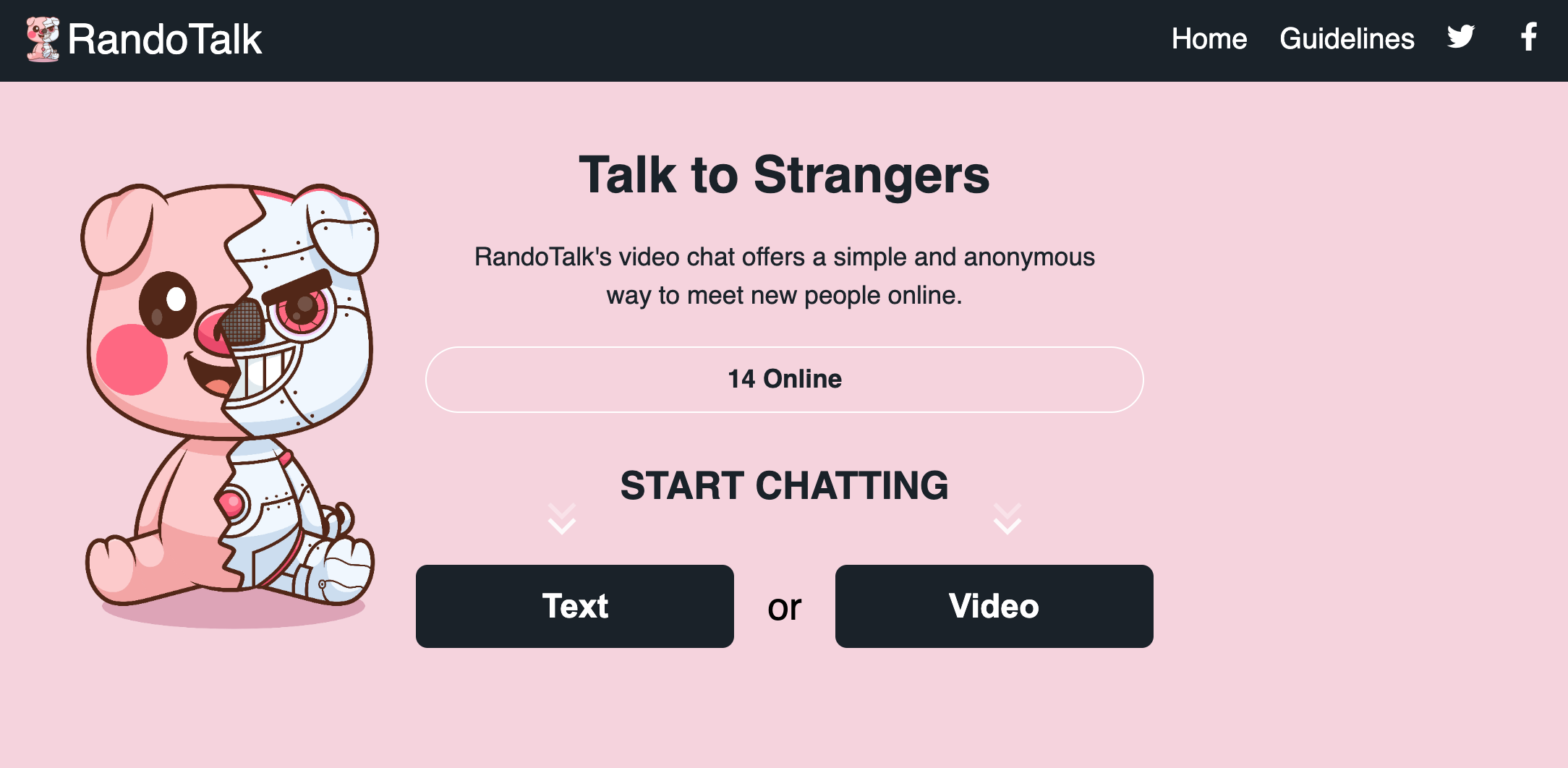Online Safety for Schools: Risks of Random Chat Apps and How to Mitigate Them

by

Bec May
The government's recent ban on social media apps for under-16s is an ambitious attempt to protect Australian children from cyberbullying, online child sexual exploitation, and adult content. It also hopes to shield them from the unrealistic ideals perpetuated by influencers whose curated, #gifted lives often bear little resemblance to reality.
The government is hoping that a blanket ban across the big players, including TikTok, YouTube, Reddit, and Discord will put the fire of social media danger out in one fell swoop. However, the internet is an ever-shifting, adaptable beast, with chat apps popping up and disappearing as quickly as rodents at a carnival whack-a-mole stand.
Random stranger chat apps are perhaps the most evasive of these platforms, allowing users to interact with random people from across the globe without knowing anything about the other person.
While some studies have found these apps allow young people to interact in the online world in a way that enables them to express their opinions and identities more freely, there are serious online safety risks involved in using these platforms.
Schools are faced with manifold issues here: how to monitor the apps students are using, how to know what they are being exposed to, and how to provide the education and resources to ensure students are responsible and vigilant digital citizens.
Exploring the risks in depth: The hidden dangers of anonymous chat apps
At first glance, chat apps may seem relatively harmless, offering an exciting and unfiltered way for young people to connect. In a landscape where high social media use breeds high levels of anxiety, feelings of inadequacy and pressure to conform, it's no surprise that many young people are seeking refuge in anonymous platforms. The allure of anonymity offers a break from the perfectionist culture of social networks and the constant cycle of validation-seeking behaviour. For some, anonymity provides them with a space to be honest and seek support about issues that carry stigma, such as anxiety, addiction or eating disorders. For others it allows them to freely express their views on political and social issues without fear of judgement from their peers.
However, the anonymity that makes these apps appealing is the same feature that fosters a breeding ground for harm. Beneath the surface of these seemingly free-spirited chats and exchanges lurk serious online risks that may not be immediately obvious and can have a lasting impact on young users.
Omegle, perhaps the most notorious of the random chat apps, was long under scrutiny before its eventual closure in 2023. Launched in 2009 by then-18-year-old Leif Brooks, Omegle gave users the chance to "talk to strangers" by pairing people for video chats. With little moderation and no age verification process, Omegle quickly became known for its wild and often sexual online encounters. Investigations conducted by the BBC during the pandemic found that predators were taping underage boys in compromising positions and were using the footage to coerce others into similar behaviours.
After years of similarly disturbing cases being reported, with Omegle being mentioned in over 50 cases against paedophiles, Brooks posted a message to the homepage stating "predators use this site"- but no safeguarding changes to the platform were made. In 2023 Omegle shut down for good as part of an out-of-court settlement with a victim of one of these predators. "Alice", as she's known in court documents, was one of five children targeted by an online predator, Ryan Fordyce on Moelge. Fordyce had collected 220 images and videos of Alice from the age of 11, carrying out sexual acts under his duress over three years of abuse. On closing the site, Brooks posted a lengthy statement highlighting some of the underlying issues that continue to plague the Wild West of the internet where random chat apps thrive.
‘Virtually every tool can be used for good or for evil, and that is especially true of communication tools, due to their innate flexibility. The telephone can be used to wish your grandmother “happy birthday”, but it can also be used to call in a bomb threat. There can be no honest accounting of Omegle without acknowledging that some people misused it, including to commit unspeakably heinous crimes.’
Key Risks of Random Chat Apps
Concerns around these apps range from data privacy issues to online child sexual exploitation:
Exposure to harmful content: Users may encounter explicit material, hate speech, violent ideologies and toxic masculinity rhetoric. Discord, for example, though primarily aimed at gamers and designed with non-political purposes, has become a hub for extreme right-wing socialising and community building, with instances of the platform being used in the coordination of violent acts and sharing of ideological propaganda materials.
Online child exploitation: One only has to log onto these apps to know how quickly users are confronted with predatory messages, inappropriate requests and sexually explicit images. Platforms such as Kik are notorious for their lack of content moderation, allowing harmful interactions to occur almost instantly and without warning. For young users these interactions can quickly escalate, leading to online grooming, and exploitation.
Data Privacy Concerns: Anonymity doesn't mean data protection for users. Apps like Monkey collect extensive personal data, including names, and IP addresses, often sharing this information with third parties. User-generated content can also be for advertising without consent, raising significant privacy risks
Omegle Replacements: Chat apps schools should monitor for online safety
While Omegle may be gone for good, random chat apps, and their dangers, persist.
The vacuum has been filled by similar apps promising harmless fun and global connection.
While some of these platforms, such as Discord and Reddit will be forced to amp up their age verification tech under the newly legislated social media ban, lesser-known apps will continue to pop up, disappear and reinvent themselves, making them difficult to monitor effectively.
Here's a breakdown of some of the most widely used random chat apps today and the dangers they pose.
Chatroulette
One of the earliest online random chat app platforms, Chatroulette pairs users for live video conversations. Early research from TechCrunch found that at least one in eight 'spins' yields something R-rated, with Emie Allen, president of the National Center for Missing and Exploited Children, telling CBS' The Early Show that the site was the ‘last place parents want their kids to be. This is a huge red flag; this is extreme social networking.’
Despite the platform experimenting with various security measures, including enforcing user sign-ups, a team of 100 moderators and partnering with artificial intelligence company Hive to automatically flag inappropriate content in video streams, explicit content and predatory behaviour still exist. With 30% of users reportedly under 18, the platform remains risky for young people.
RandoTalk

Randotalk is another anonymous chat app gaining popularity among young people online. It allows users to instantly chat with strangers from around the globe with no sign-up or age verification required. While apps like these have relatively low user numbers, their relative obscurity means they easily fly under the radar of schools and parents looking to monitor their children's online activities
Monkey
A random video chat app targeted at teens, Monkey offers 15-second face-to-face chats to see if users 'vibe'. Presumably named Monkey as part of a marketing strategy highlighting the app's playful and fun nature, the app has weak moderation exposing young people to explicit material and potential privacy violations through their extensive data collection.
MeowChat
MeowChat blends random chatting with social networking and collaborative gameplay, allowing users to connect in public or private chatrooms. With playful branding and an approachable design, this app appeals to younger audiences seeking new online interactions. Users can choose to hide their age and there is no age verification process currently in place.
Camsurf
A random video app that is marketed as family-friendly, yet requires no sign-up. Camsurf's slick interface and one-click entry make this app particularly appealing, and equally as dangerous for young users, leaving them vulnerable to online grooming and predatory behaviour.
StrangerMeetup
StrangerMeetup promotes the benefits of talking to strangers, claiming it can make users 'feel more happy and alive.' While users can log in for additional features, it's not mandatory, and chats can begin with a couple of clicks. The danger of this platform lies in its focus on the positives of connecting with strangers while glossing over the significant risks. Article links on the homepage including ‘How To Catch A Girl's Attention’ and ‘How to Make Friends Online’ appeal directly to young people, making them particularly vulnerable to predatory behaviour.
KiK
A messaging app that allows users to create anonymous accounts and connect with strangers private chats and public groups, Kik has been linked to numerous cases of online grooming and child sexual abuse. Despite law enforcement regularly highlighting incidents involving explicit images and dangerous in-person meetings, the platform remains a popular app amongst teens.
Omegle Clones: Platforms filling the void
When Omegle officially shut down in 2023, opportunistic developers quickly filled the void with copycat platforms that capitalised on its recognisable branding. Sites including Omegle.life, Uhmeagle, Ome.TV and NSFW Omegleme have tweaked the original name while replicating its minimalist design and 'free random chat' promises to attract former users.
Why Firewalls Struggle with Chat Apps and How Monitoring Provides a Solution
Unfortunately, firewalls aren't great at categorising chat apps due to the following reasons:
Encrypted Traffic: Many chat apps use end-to-end protocols to protect user privacy. While this is crucial for protecting sensitive data during transmission, it also conceals the data from firewalls, making it difficult to inspect and categorise the traffic accurately.
Inconsistent Categorisation: Our tests found that most Firewalls struggle to delineate between high-risk chat apps such as Kik and general messaging platforms such as Google Meet. They are either categorised as ‘VoIP’, ‘Internet Communications and Telephony’ or ‘Instant Messaging’, or are grouped alongside unrelated websites like urbandictionary.com under ‘Other Adult Materials’. Tailored URL lists, like the one we’ve included below, allow schools and organisations to create custom categories, ensuring only approved platforms are accessible.
Rapid Application Evolution: The random chat landscape is continually evolving, with new apps frequently emerging and existing apps regularly updating their features and communication protocols. This rapid change outpaces the firewall's ability to recognise and categorise the traffic, particularly when the firewall's database isn't updated promptly.
The Use of Content Delivery Networks (CDNs): Many chat applications deliver their services through CDNs which are also used by numerous other services, including streaming platforms, cloud providers and e-commerce sites, creating significant challenges for firewalls. CDNs regularly host multiple services on the same IP range, making it difficult to block a chat app without inadvertently affecting the other platforms. CDNs also frequently update or rotate their domain names and IP addresses, complicating static blocklists.
Application Layer Complexity: Chat apps often operate at the application layer, embedding their traffic within standard web protocols like HTTP and HTTPS. This embedding makes it difficult for firewalls to distinguish chat app traffic from regular web browsing.
How Internet Monitoring Can Help to Identify Chat Apps
Internet monitoring tools can bridge the gap by providing actionable insights into network traffic:
Comprehensive reports: Fastvue generates easy-to-read reports on user activity, helping administrators identify patterns of risk behaviour or attempts to access random chat apps
Real-time alerts: Receive alerts for unusual or high-risk activity enabling quick intervention and better oversight.
Site Clean Technology: Fastvue’s unique site clean technology cuts through the noise of ads and CDNs, giving educators a clear uncluttered view of actual site activity.
Current URL list of dangerous chat apps
To support your efforts, we've come up with a current URL list of offending chat apps. We encourage you to import these into a custom category in your firewall so you can block and report on them.
Practical Online Safety Tips for Schools: Protecting Students from Chat App Risks
Educate on Digital Literacy
Protecting students from the risks associated with these apps starts with education.
Incorporate online safety into the Curriculum: Teach students to identify red flags and how to respond to requests for personal information, inappropriate messages or suspicious links. The eSafety Commissioner has some valuable, age-appropriate classroom resources for teachers to use including slide decks and lesson plans.
Foster Open Dialogue: Schools should create an environment where students feel comfortable discussing their online experiences. Schedule regular check-ins where children can talk about app usage, ask questions or raise any concerns
Create safe reporting channels: By establishing anonymous reporting channels, students can flag concerning behaviour or incidents without fear of retribution or involvement from their peers and teachers.
Implement Monitoring Tools
By leveraging technology to monitor and manage online activities on school devices and networks, educators can ensure safer online environments for students. Schools should look to tools that offer:
Comprehensive Monitoring and Reporting: Detailed reports on internet usage, helping administrators to identify patterns of risky behaviour of access to platforms that aren't age-appropriate.
Application and Website Oversight: Implement systems that monitor which apps and websites are being accessed on school networks, flagging high-risk platforms such as random chat apps or sites frequently linked to unsafe content.
User Activity Insights: Employ software that tracks user activity in real-time, enabling key people to identify and address excessive use of unapproved communication apps or indicative search terms like 'omegle alternatives'
Behavioural Alerts: Utilise tools that generate automatic alerts for unusual or potentially harmful online behaviour, allowing pastoral care teams to intervene quickly.
Collaboration with Parents
By engaging with families, schools can ensure a consistent approach to internet safety at school and home.
Host Workshops: Provide parents with the tools and knowledge to monitor their children's online activities, including how to identify risky behaviour. This is also a great opportunity for schools to describe in detail their safety strategy, what software is in place, and how any monitoring and reporting is dealt with by the pastoral care team. While most parents are happy to sign off on digital monitoring technologies, issues can arise when they feel they have been over or under-communicated when troubling searches are flagged.
Share Resources: Distribute guides, videos and other resources that explain emerging platforms and their risks.
Promote Communication: Encourage parents to have conversations with their children about online safety, creating open dialogue without blame or shame.
While the Australian government's social media ban for those under 16 will address some online safety concerns, the evolving nature of the internet continues to present new risks through random chat apps. Schools, parents and communities need to remain vigilant by implementing education, monitoring tools and fostering open communication to protect children online.
Don't take our word for it. Try for yourself.
Download Fastvue Reporter and try it free for 14 days, or schedule a demo and we'll show you how it works.
- Share this storyfacebooktwitterlinkedIn

